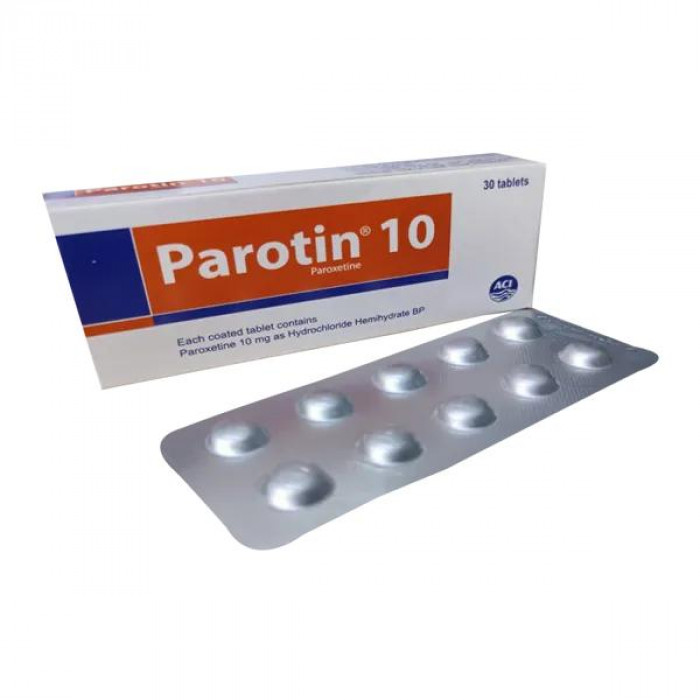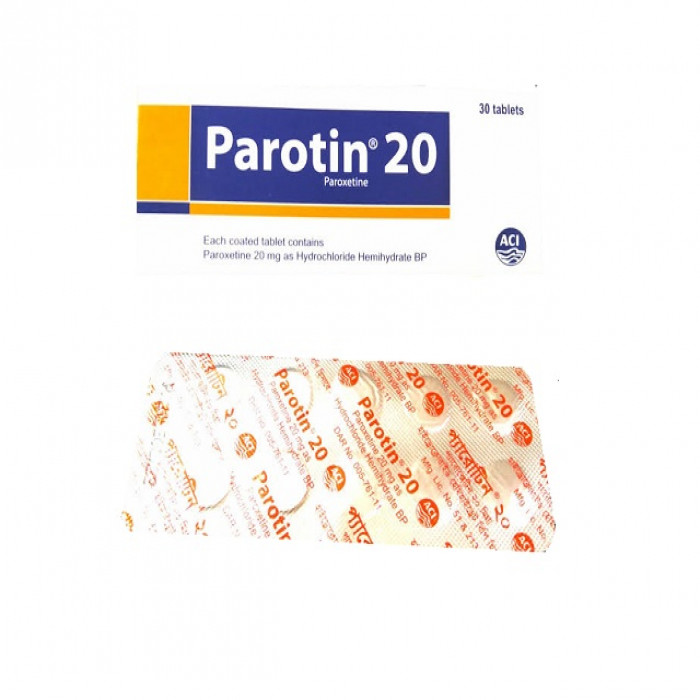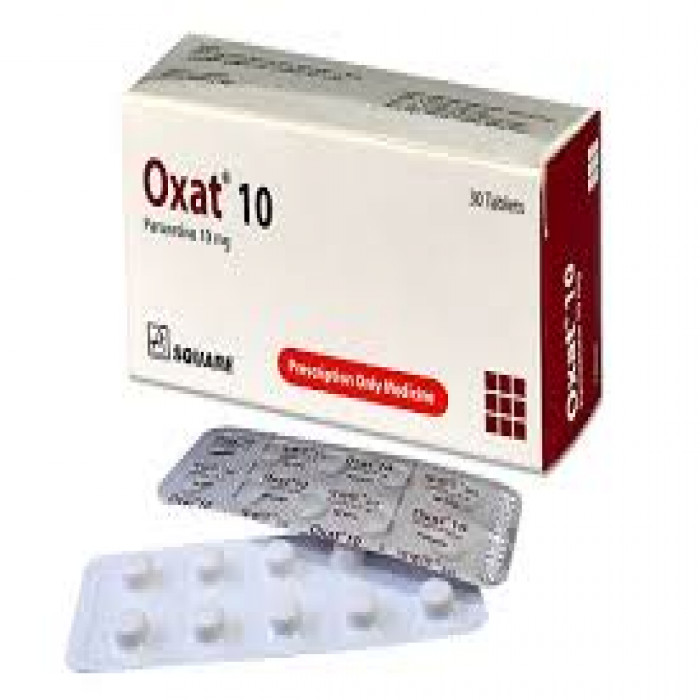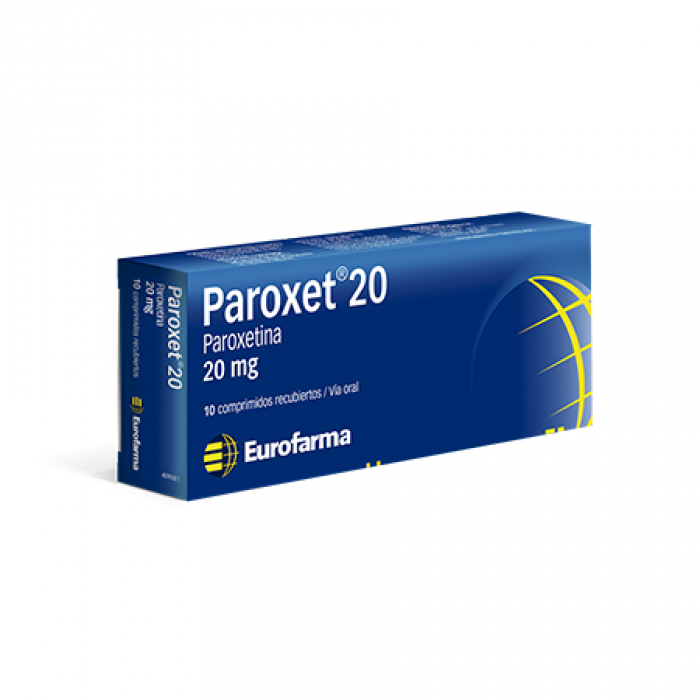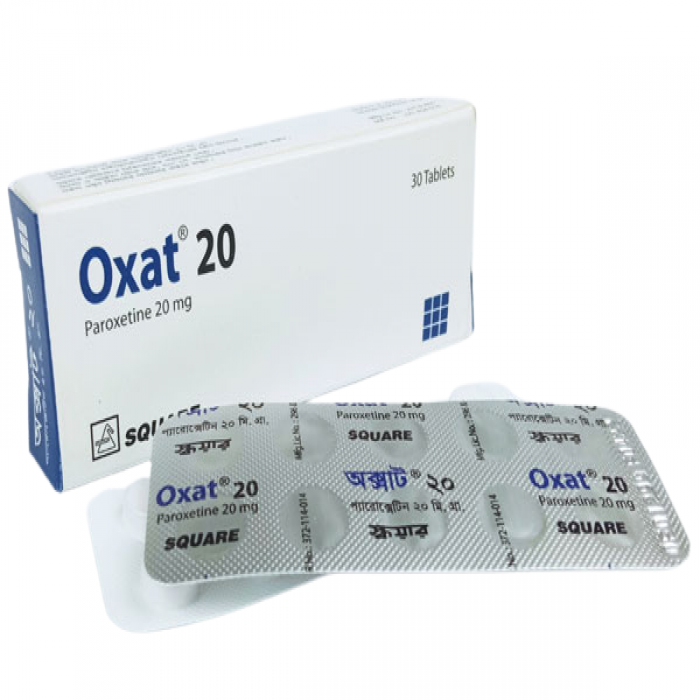
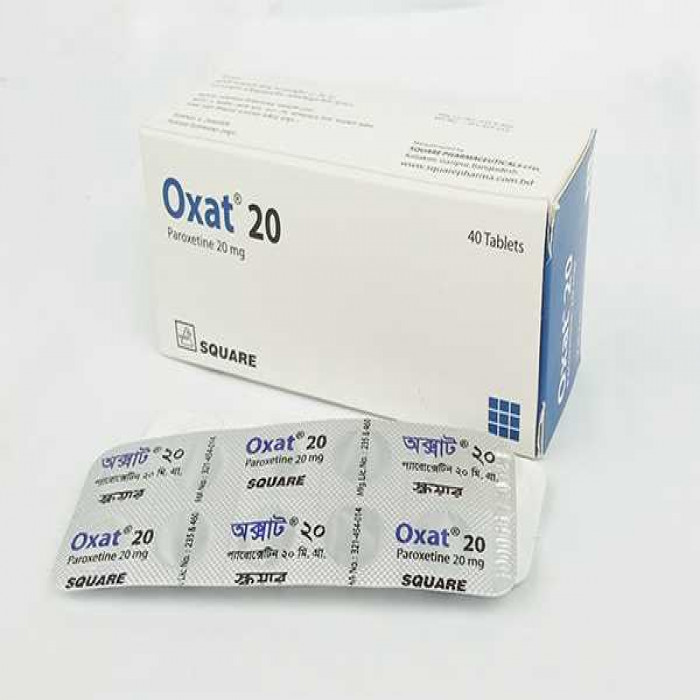
✔ 100% Authentic Product
👁️ Currently Viewing 7752
Paroxetine Hydrochloride is an antidepressant used for treating mental disorders like OCD, depression, anxiety, and PTSD. It can also help with menopause-related symptoms such as hot flashes and night sweats.
📄Prescription Required
Discount
Price: ৳ 114
MRP:
৳
120.3
5%
Off

100% Genuine Products, Guaranteed

Safe & Secure Payments, Always

Fast, Secure & Efficient Delivery

Proper Packaging
 Cash on Delivery - All over Bangladesh
Cash on Delivery - All over Bangladesh Regular Delivery - 12-24 Hours, Dhaka City* Charge Tk.39-59
Regular Delivery - 12-24 Hours, Dhaka City* Charge Tk.39-59 Regular Delivery - 24-48 Hours, Other Cities* Charge Tk.99-110
Regular Delivery - 24-48 Hours, Other Cities* Charge Tk.99-110
🌙 রমযান অফার 🌙
 ফ্রি ডেলিভারিঃ - ৭৯৯ টাকা+ অর্ডারে, ঢাকা
শহরে
ফ্রি ডেলিভারিঃ - ৭৯৯ টাকা+ অর্ডারে, ঢাকা
শহরে ফ্রি ডেলিভারিঃ - ২৭৯৯ টাকা+ অর্ডারে, ঢাকার
বাহিরে
ফ্রি ডেলিভারিঃ - ২৭৯৯ টাকা+ অর্ডারে, ঢাকার
বাহিরে
📲 মোবাইল অ্যাপ অর্ডারে সাশ্রয় বেশী
-
Google Play Store থেকে ডাউনলোড
-
Apple Store থেকে ডাউনলোড
100% Genuine Products, Guaranteed
Safe & Secure Payments, Always
Fast, Secure & Efficient Delivery
Proper Packaging
 Cash on Delivery - All over Bangladesh
Cash on Delivery - All over Bangladesh Regular Delivery - 12-24 Hours, Dhaka City* Charge Tk.39-59
Regular Delivery - 12-24 Hours, Dhaka City* Charge Tk.39-59 Regular Delivery - 24-48 Hours, Other Cities* Charge Tk.99-110
Regular Delivery - 24-48 Hours, Other Cities* Charge Tk.99-110 ফ্রি ডেলিভারিঃ - ৭৯৯ টাকা+ অর্ডারে, ঢাকা
শহরে
ফ্রি ডেলিভারিঃ - ৭৯৯ টাকা+ অর্ডারে, ঢাকা
শহরে ফ্রি ডেলিভারিঃ - ২৭৯৯ টাকা+ অর্ডারে, ঢাকার
বাহিরে
ফ্রি ডেলিভারিঃ - ২৭৯৯ টাকা+ অর্ডারে, ঢাকার
বাহিরে- Google Play Store থেকে ডাউনলোড
- Apple Store থেকে ডাউনলোড
🌙 রমযান অফার 🌙
📲 মোবাইল অ্যাপ অর্ডারে সাশ্রয় বেশী
✅ Description:
Oxat 20mg Tablet is an antidepressant medication used to treat major depressive disorder, OCD, panic disorder, social anxiety disorder, post-traumatic stress disorder, premenstrual dysphoric disorder, and generalized anxiety disorder. It contains 'Paroxetine,' a selective serotonin reuptake inhibitor that increases serotonin levels in the brain, regulating mood and alleviating depression and anxiety.
Take Oxat 20mg Tablet as prescribed by your doctor, and continue the treatment based on your medical condition and response. Common side effects may include insomnia, dizziness, headache, diarrhea, nausea, fatigue, dry mouth, loss of appetite, and sexual disturbances. If these side effects persist or worsen, consult your doctor.
Pregnant women should avoid Oxat 20mg Tablet as it may harm the fetus. Breastfeeding women should consult their doctor before taking the medication. Avoid driving or operating machinery due to possible dizziness, confusion, sleepiness, and blurred vision. The medication is not recommended for children under 18 years old, as its safety and effectiveness have not been established. Refrain from alcohol consumption while on Oxat 20mg Tablet 10's, as it may worsen symptoms or side effects. Keep your doctor informed about your health condition and other medications to prevent potential interactions or side effects.
Oxat 20 is an antidepressant that belongs to the selective serotonin reuptake inhibitor (SSRI) class of medications. It is commonly used to treat depression and anxiety disorders such as panic disorder, obsessive-compulsive disorder, and post-traumatic stress disorder (PTSD). Many people benefit from Oxat 20 by improving their mood and relieving anxiety and tension.
Safety Advices

Alcohol
UNSAFE
It is found that the consumption of alcohol is unsafe with Oxat 20mg Tablet.

Pregnancy
UNSAFE
The use of Oxat 20mg Tablet by pregnant women is not recommended as the risk of adverse effects on the fetus is very high. Consult your doctor if you are pregnant or are planning a pregnancy while taking this medicine.

Breastfeeding
SAFE IF PRESCRIBED
Use of this medicine by breastfeeding women is not recommended unless necessary. If necessary, your doctor may advise you to stop breastfeeding before treatment with this medicine is initiated.

Driving
CAUTION
Oxat 20mg Tablet may cause side effects that affect the alertness of the patient. Thus driving must be avoided if you are taking this medicine.

Kidney
CAUTION
Caution in patients with kidney disease is needed. Adjustment of dose might be needed. Kindly consult your doctor before taking this medication.

Liver
CAUTION
Caution in patients with liver disease is needed. Adjustment of dose might be needed. Kindly consult your doctor before taking this medication.
✔️ Uses of Oxat 20mg Tablet
- Depression
- Panic disorder
- Major depressive disorder
- Social anxiety disorder
- Premenstrual dysphoric disorder
- Generalized anxiety disorder.
- Obsessive-compulsive disorder
- Post-traumatic stress disorder
✔️ How does Oxat 20mg Tablet work?
Oxat 20mg Tablet works by increasing the level of a certain chemical (serotonin) in your brain. Thus it improves your mood, decreases fear, anxiety, or unwanted thoughts, and helps restore your interest in daily activities.
✔️ Side Effects of Oxat 20mg Tablet
- Delayed ejaculation
- Low sexual desire
- Nausea
- Tremor
- Confusion
- Dizziness
- Dryness in mouth
- Erectile dysfunction
- Fatigue
- Increased sweating
- Insomnia (difficulty in sleeping)
- Loss of appetite
- Nervousness
- Sleepiness
✔️ Quick Suggestions:
- It can take 2-3 weeks for Paroxetine to start working.
- Do not stop treatment suddenly as this may cause upset stomach, flu-like withdrawal symptoms, and sleep disturbance.
- If your doctor asks you to stop Paroxetine, you should reduce the dose slowly over 4 weeks.
- Avoid consuming alcohol when taking Paroxetine, as it may cause excessive drowsiness and calmness.
- The addiction/dependence potential of Paroxetine is very less.
✔️ Indication of Oxat 20mg Tablet
Paroxetine is used in the treatment of depression, Panic disorder, and anxiety disorder.
✔️ Pharmacology
Paroxetine is a selective serotonin reuptake inhibitor (SSRI), which means it specifically targets serotonin reuptake transporters and inhibits the reuptake of serotonin in the brain. By doing so, it increases the concentration of serotonin in the synapses between nerve cells, leading to enhanced serotonin neurotransmission and mood regulation.
Unlike some other antidepressants, Paroxetine has limited direct action at other neurotransmitter sites, including muscarinic receptors. This selective action on serotonin reuptake is what contributes to its effectiveness in treating various mental disorders, such as depression, anxiety, OCD, and other conditions mentioned earlier. The limited interaction with other receptors also helps in reducing the potential side effects associated with non-selective neurotransmitter modulation.
✔️ Dosage & Administration of Oxat 20mg Tablet
The recommended adult doses for Paroxetine in various conditions are as follows:
Depression, Anxiety, Posttraumatic Stress Disorder:
- Initial dose: 20 mg daily
- Increase gradually, if necessary, by 10-mg increments weekly
- Maximum dose: 50 mg/day
Obsessive-Compulsive Disorder, Social Anxiety Disorder:
- Initial dose: 20 mg daily
- Increase weekly in 10-mg increments
- Maintenance dose: 40-60 mg daily
Panic Disorder with or without Agoraphobia:
- Initial dose: 10 mg daily
- Increase weekly in 10-mg increments according to clinical response
- Maintenance dose: 40-60 mg daily
For elderly patients:
- Initial dose: 10 mg daily
- Increase if needed by 10 mg/day at 1-week intervals
- Maximum dose: 40 mg daily
For patients with severe hepatic impairment:
- Severe hepatic impairment: 10 mg daily
- Increase to a maximum of 40 mg daily as necessary
For patients with severe renal impairment:
- Severe renal impairment: 10 mg daily
- Increase to a maximum of 40 mg daily as necessary
It's essential to follow the prescribed dosing regimen and consult a healthcare professional for individualized treatment and dosage adjustments. The use of Paroxetine in children has not been established for safety and efficacy, so it is not recommended for pediatric patients.
Take Oxat 20mg Tablet in the morning with food to prevent stomach upset.Tablet/Capsule: Swallow it as a whole with a glass of water; do not chew or crush the tablet/capsule.
✔️ Interaction
Oxat 20mg Tablet may interact with various drugs, including:
- Blood thinners: Warfarin, clopidogrel
- Anti-psychotics: Perphenazine, thioridazine, clozapine, lithium, risperidone
- Antidepressants: Clomipramine, moclobemide, methylthioninium chloride/methylene blue, nortriptyline, desipramine
- NSAIDs: Acetylsalicylic acid (aspirin), ibuprofen, celecoxib, etodolac, diclofenac, meloxicam, tramadol, pethidine
- Anti-cancer: Tamoxifen
- Anti-migraine: Sumatriptan
- Dietary supplement: Tryptophan
- Opioid analgesics: Fentanyl
- Anti-HIV: Ritonavir, fosamprenavir
- Anti-convulsants: Phenobarbital, phenytoin, carbamazepine
- Antiarrhythmics: Propafenone, flecainide
- Anti-hypertensive: Metoprolol
- Anti-TB: Rifampicin
- Antibiotic: Linezolid
- Statin: Pravastatin
- Neuromuscular blockers: Mivacurium, suxamethonium
- Norepinephrine reuptake inhibitor: Atomoxetine
- The herbal supplement used to treat depression: St. John's wort
- Anticholinergic medication: Procyclidine
It's crucial to inform your doctor about any existing medical conditions you have, such as glaucoma, diabetes, epilepsy, mania, bleeding problems, hyponatremia (low sodium levels), and heart, liver, or kidney dysfunction, as these can also impact the use of Oxat 20mg Tablet and may require special considerations or dose adjustments.
As for drug-food interactions, there are no specific interactions established for Oxat 20mg Tablet with food.
Always consult your healthcare professional before starting or stopping any medication to avoid potential interactions and ensure safe and effective treatment.
✔️ Contraindications
Paroxetine is not recommended for patients who are known to be allergic to paroxetine or any of its components. It should not be taken with pimozide, thioridazine, or MAO inhibitors.
✔️ Pregnancy & Lactation
Paroxetine is classified as Pregnancy Category D, indicating that there is evidence of risk to the fetus, and its use during pregnancy should only be considered if the potential benefits outweigh the potential risks to the developing baby.
Regarding lactation, the safety of Paroxetine in breastfeeding women is not well-established. Due to the lack of sufficient data, it is generally recommended to avoid using Paroxetine during lactation unless the potential benefits to the mother outweigh the potential risks to the breastfeeding infant. If a lactating woman needs to take Paroxetine, close monitoring of the baby for any adverse effects is essential.
As with any medication, it is crucial for pregnant or breastfeeding women to consult their healthcare provider before starting or continuing any treatment to ensure the best course of action for both the mother and the baby's well-being. The healthcare provider can weigh the potential risks and benefits and provide guidance on the most appropriate treatment plan.
✔️ Precautions & Warnings
- Consult your doctor immediately if you experience suicidal thoughts, such as thoughts of harming or killing yourself.
- Inform your doctor if you have a history of or current conditions like epilepsy, mania, diabetes, low sodium levels in your blood, glaucoma, or are undergoing electro-convulsive therapy for severe depression.
- Avoid taking Oxat 20mg Tablet during pregnancy, as it may harm the fetus. Consult your doctor if you are breastfeeding before taking the medication.
- Refrain from driving or operating machinery while on Oxat 20mg Tablet 10's, as it may cause dizziness, confusion, sleepiness, and blurred vision.
- The medication is not recommended for children below 18 years of age, as its safety and effectiveness have not been established in this age group.
- Avoid consuming alcohol while taking Oxat 20mg Tablet 10's, as it may worsen your symptoms or side effects.
- Always follow your doctor's advice and adhere to the prescribed dosage and instructions for safe and effective treatment.
✔️ Storage Conditions
- Keep this medicine out of the sight and reach of children.
- Do not use this medicine after the expiry date which is stated on the carton.
- Do not store it above 25°C.
- Do not throw the medication via household waste or wastewater. Ask your pharmacist about the proper disposal of medicines no longer required.
⚠️Disclaimer:
At ePharma, we’re committed to providing accurate and accessible health information. However, all content is intended for informational purposes only and should not replace medical advice from a qualified physician. Please consult your healthcare provider for personalized guidance. We aim to support, not substitute, the doctor-patient relationship.




